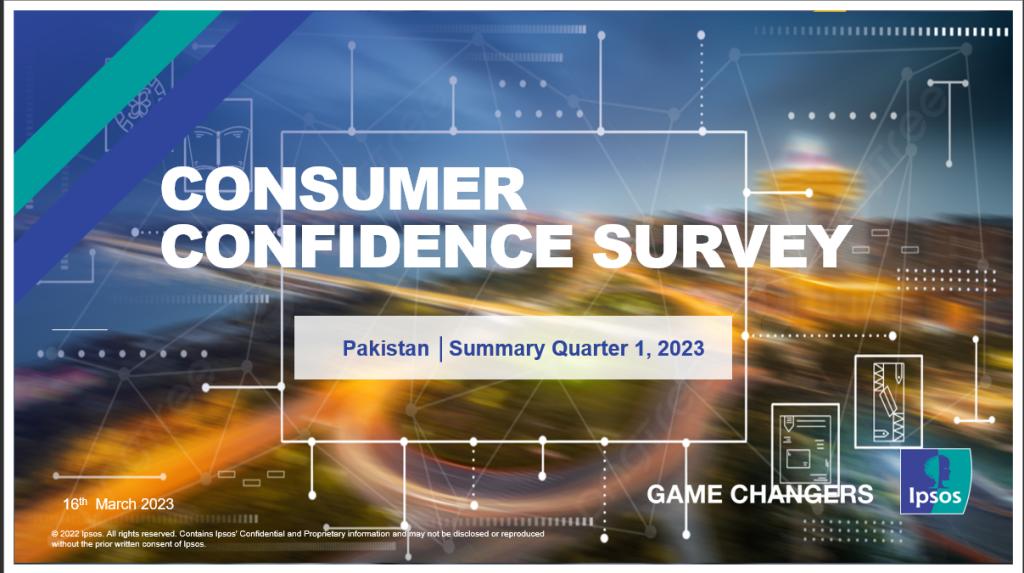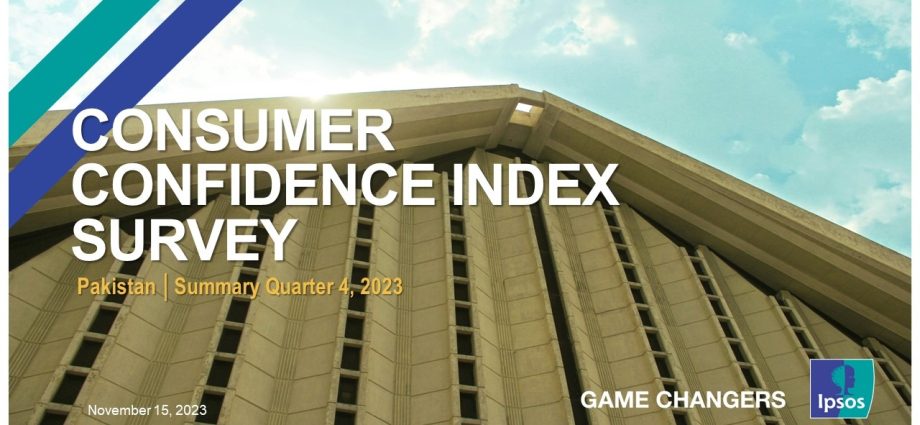
Latest IPSOS Global GCCI survey for Quarter 1, 2024, reveals a significant decline in Pakistan’s standing compared to five years ago
According to survey only 1 in 10 Pakistanis believes that the country is heading in the right direction
According to survey 6 out of 10 Pakistanis believe that economic condition of the country is weak
ISLAMABAD ( Web News )
The latest IPSOS Global Consumer Confidence Index (GCCI) survey for Quarter 1, 2024, reveals a significant decline in Pakistan’s standing compared to five years ago.
Instead of progressing, the country has regressed over this period, losing five years of organic growth and development. Economic challenges persist, leading to widespread discomfort among the population regarding daily purchases and future investments.
Pakistan’s journey in the survey shows significant fluctuations. An initial dip during the Covid-19 period in 2019-2020 was followed by a remarkable improvement in 2021, attributed to effective perception management strategies. However, this recovery was short-lived, with a subsequent downslide in 2022-23 due to political experiments. The IMF stand-by agreement at the end of the PDM-led government brought a bounce back in Quarter 3 2023, and the caretaker government stabilized the situation, leading to a positive trajectory from September 2023 onwards.
Pakistan’s global standing remains the lowest, even among emerging markets like Brazil, India, and South Africa. Despite facing unique challenges and global crises such as the COVID-19 pandemic, Russia/Ukraine war, and Middle East turmoil, these economies have managed to improve consumer confidence over the past five years, unlike Pakistan.
Lessons Learned: The data suggests two key lessons. Firstly, allowing governments to complete their five-year terms is crucial for political stability, which is a prerequisite for economic stability. Premature changes in government can hinder consistent growth. Secondly, the survey emphasizes the importance of perceptions, which can carry more weight than reality. The incumbent government, while having an economic reform agenda, should set realistic targets and Key Performance Indicators (KPIs) based on survey data for effective perception management, ensuring sustained and improved confidence among the public and investors over time.
Moreover, survey highlight following insights about behaviors and perceptions of Pakistanis:
o Only 1 in 10 Pakistanis believes that the country is heading in the right direction. Males are twice more optimistic than females. Despite still being low, there’s stability in optimism since the caretaker government took over in Quarter 3, 2023.
o Economic problems continue to top the list of worrying issues for Pakistanis. However, a slight decrease can be seen in the perception of inflation as the most worrying issue since Quarter 4, 2023.
o 6 out of 10 Pakistanis believe that economic condition of the country is weak. People from Lower SECs classes are even more pessimistic.
o 3 in 10 Pakistanis expect the local economic situation to improve in the next 6 months, while 4 in 10 anticipate their financial conditions getting better in the same period.
o Only 1 in 10 Pakistanis shows confidence in future savings and investments. Nevertheless, 98% of Pakistanis remain uncomfortable making major purchases like homes or cars.
o 6 out of 10 Pakistanis claim to personally know someone who lost their job due to economic conditions. Five years ago, this perception was half
o Confidence in job security has remained unchanged since the last quarter, with the majority (88%) still expressing lower confidence.
o In this quarter, Pakistan’s score remains the lowest in the Global Consumer Confidence Index (GCCI) among other emerging economies despite the slight signs of recovery.
Quarter 1, 2024, the latest wave of the Ipsos Global Consumer Confidence Index (GCCI) survey holds a unique significance for Pakistan as it serves as baseline for the newly incumbent federal government. We initiated this ongoing survey in Pakistan almost five years ago, when Pakistan Tehreek-e-Insaf (PTI) government completed its first year in Islamabad. Please note that critical tracking GCCI questions ask the respondents to extend their views and perceptions un comparison to preceding one year. Regrettably, Pakistan’s standing today is considerably lower than it was back then.
Across this half a decade, instead of improvements, we have regressed. In essence, Pakistan has lost five organic years of growth and development. Economic woes persist, and much of the population remains uncomfortable making daily purchases or investments.

